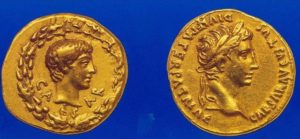 Under the Ptolemies, the Jews had been part of the community of “Hellenes,” the dominant group of Greek-speaking conquerors. When the Romans, in their turn, conquered Egypt, the situation was altered from top to bottom. There was no room within the limits of Roman law for the community of Hellenes, a cultural rather than a national concept. It was made up of (differentiated), each with its own particular identity, and the sum of these elements could not be recognized as a single “nation” or “people.” Conversely, the links that bound the Hellenes to their original motherlands were not solid enough to justify individual citizenship. In Roman eyes, the descendants of Athenian immigrants from the era of the first Ptolemies (313 B.C.E.) could not pretend to be citizens of Athens, nor could the descendants of Samian immigrants claim to be citizens of Samos, nor could those of the Corinthians be citizens of Corinth. The mass of individuals who called themselves “Greek” and considered themselves to be citizens were neither a “city” nor a “nation”; as a group, they were too heterogeneous, and their constituent parts were unclassifiable. They were doomed to disappear. The coming of the Romans sounded the death knell of the “Hellenes.” Under Roman rule, they were literally pulverized. Provincial society was totally restructured. For the Jews of Egypt, it was a veritable disaster.
Under the Ptolemies, the Jews had been part of the community of “Hellenes,” the dominant group of Greek-speaking conquerors. When the Romans, in their turn, conquered Egypt, the situation was altered from top to bottom. There was no room within the limits of Roman law for the community of Hellenes, a cultural rather than a national concept. It was made up of (differentiated), each with its own particular identity, and the sum of these elements could not be recognized as a single “nation” or “people.” Conversely, the links that bound the Hellenes to their original motherlands were not solid enough to justify individual citizenship. In Roman eyes, the descendants of Athenian immigrants from the era of the first Ptolemies (313 B.C.E.) could not pretend to be citizens of Athens, nor could the descendants of Samian immigrants claim to be citizens of Samos, nor could those of the Corinthians be citizens of Corinth. The mass of individuals who called themselves “Greek” and considered themselves to be citizens were neither a “city” nor a “nation”; as a group, they were too heterogeneous, and their constituent parts were unclassifiable. They were doomed to disappear. The coming of the Romans sounded the death knell of the “Hellenes.” Under Roman rule, they were literally pulverized. Provincial society was totally restructured. For the Jews of Egypt, it was a veritable disaster.
… Under Augustus (e.g. 27 B.C.E. – C.E.), (the Jews) were suddenly wrenched from their erstwhile condition as an integral part of the Greek-speaking minority. They had been “Hellenes”; now, they had suddenly become “Egyptians.”
Things were not much better in Alexandria. Although the Jews were the social equals of the Greeks, they were not Alexandrian citizens, save in very few instances. We shall shortly examine the case of a Jew whose father had been a citizen of Alexandria before the Roman conquest, but had not been able to transmit his citizenship to his son. His was an exceptional case, as rare as was the promotion of an Alexandrian Jew to the rank of a Roman citizen. Only one family of rich notables is known to have achieved this status: the alabarch Alexander and his sons, the objects of imperial favor, probably that of Augustus himself.
In incisive words, Josephus paints a picture of the tense atmosphere that reigned in Alexandria immediately after the Roman conquest.
Josephus, The Jewish War 2, 437-89
At Alexandria (e.g. Egypt) there had been incessant strife between the native inhabitants and the Jewish settlers since the time when Alexander (e.g. Alexander the Great), having received from the Jews very active support against the Egyptians (e.g. 332), granted them, as a reward for their assistance, permission to reside in the city on terms of equality [ex isomoirias] with the Greeks. This privilege was confirmed by his successors, who, moreover, assigned them a quarter of their own, in order that, through mixing less with aliens, they might be free to observe their rules more strictly; and they were also permitted to take the title of Macedonians. Again, when the Romans took possession of Egypt, neither the first Caesar [Julius] nor any of his successors would consent to any diminution of the honors conferred on the Jews, since the time of Alexander. They were, however, continually coming into collision with the Greeks, and the numerous punishments inflicted daily on the rioters of both parties by the authorities only served to embitter the quarrel.
Source: Joseph Mélèze Modrzejewski. The Jews of Egypt. (p. 161, 163, 165)